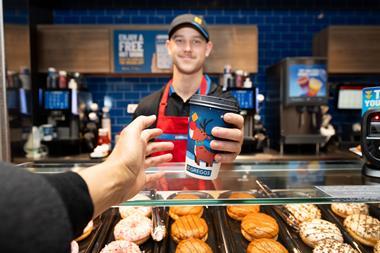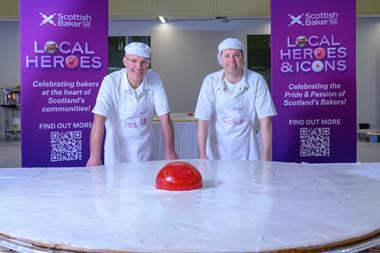Cake condensed into small cubes for easy transportation to my holiday in space? At least there’d be no excess baggage charge.
That’s one of the predictions made in a report commissioned by Tate & Lyle Sugars on the tech-based cake trends of the future.
Report authors The Future Laboratory claim everything we eat by 2040 will be customised to personal preferences and dietary requirements, right down to our DNA. Dining is set to become more personalised and tailored to individual lifestyles.
“The future of cake is an exciting one,” says The Future Laboratory strategic foresight editor Rebecca Coleman.
“In tandem with the rise of virtual reality, 3D printing, ingredient bio-hacking, as well as increasing consumer desire for sustainability and experiential dining, the celebratory desserts of tomorrow will be as varied as they are innovative.”
One thing we may be able to look forward to is a Data Dessert based on personal data right down to our genetic make-up.
“Artificial intelligence-enabled homes will be the future, knowing not only what we need but also what we are craving to eat,” states the report.
I love a customised bake (particularly if it’s monogrammed), and a cake made up of the ingredients I’m craving before I even know I am is something I can get on board with. There’s nothing more frustrating than staring at the cupboards with no idea what you want to eat – problem solved, the AI kit knew three hours ago.
Now, if only a cup of tea would show up when I wanted it.
“With space travel due to increase, so too will the rise of humans starting to holiday, work and live off earth,” said the report. “As taste buds are affected by gravity, dulling down the flavour of food, big flavours such as fiery heat in the form of chilli, and the sweetness of sugar, will be key ingredients to combat the lack of flavour zero gravity creates.”
Can you imagine how annoying it would be to take a cake to another planet, sit down to eat it and discover its lacking in flavour? Fear not, we may have Galactic Gateau.
“The Japanese have been working on innovative ways to overcome this flavour issue and have been looking at using robots to create cakes that are in cube form,” says the report.
It adds that the cubes would recreate the flavour, texture, colour and nutritional content of a normal cake, but adjust to the big flavours needed in space. “It could even be possible that family and friends on earth can personalise a cake and transmit the recipe straight to space for instant 3D printing, with optimal flavour,” it states. Deliveroo, eat your heart out.
As well as enjoying cake in space, the consumers of the future may also be eating in virtual reality (VR).
“With people attending parties via VR headsets, it’s only natural that enjoying food virtually together will follow. Users will be able to see, taste, smell, touch and hear the food in front of them, with the use of aromatic diffusers, headsets and sensors bringing food to life.”
Call me old-fashioned but I’m an advocate of eating as an occasion. Taking away the need for people to get together to eat and replacing it with a headset seems like a step back. As if people using their phones at the dinner table weren’t bad enough…
Higher in my estimations, however, is Petri Pudding.
Forget old-fashioned baking, “the next decade will see a trend of protein alternatives produced in labs, with petri dish ingredients ushering in a new era of high-tech cake creation. The Petri Pudding of tomorrow will be made with in-vitro eggs, algae baking powder and flavouring from extinct plants.”
And, catering for those who don’t fancy a trip to another planet but who still seek an out of this world experience is the Levitating Cake.
“Advancements in engineering and science mean those who may not want to space-travel can still enjoy an out-of-this-world experience, the Levitating Cake – the ultimate multi-sensory wonder,” says the report.
“The celebratory dessert could potentially be as light as a cloud and even appear to levitate like one. It will use unconventional ingredients to add depth and surprise, as well as mixing savoury, sweet and sour tastes for advanced future palates.”
































No comments yet